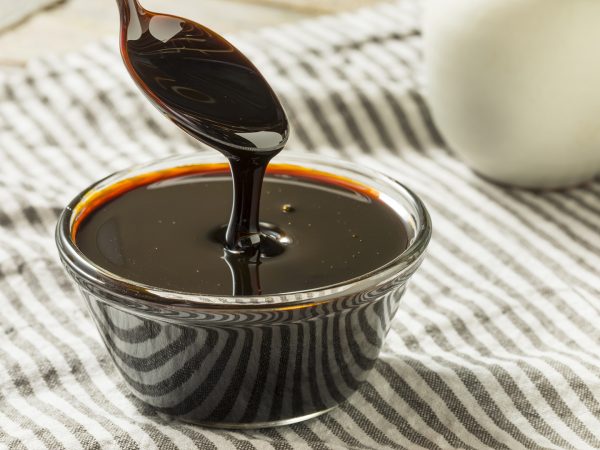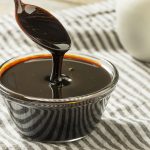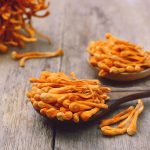A Spoonful Of Molasses?
I have been reading a lot about the health benefits of eating molasses daily. What is your take on it?
Andrew Weil, M.D. | October 8, 2021

I’m a big fan of molasses. Unlike refined white sugar, molasses is high in minerals. There’s also an increasing amount of evidence that suggests a number of the compounds in molasses have health benefits.
Before you start eating a spoonful of molasses every morning, remember this: It’s still first and foremost a sweetener. At 58 calories and 15 grams of sugar per tablespoon, you’ll want to use it in moderation — that’s already about half of your recommended daily sugar intake!
That said, using molasses, and especially the darker blackstrap molasses, as a natural sugar substitute in your cooking and baking can be beneficial to your health. A typical tablespoon of molasses contains 41 mg calcium (3 percent of your recommended daily allowance), 48 mg magnesium (11 percent RDA), 292 mg potassium (6 percent RDA), as well as other micronutrients like iron (5 percent RDA), copper (10 percent RDA), manganese (13 percent RDA), selenium (6 percent RDA), and vitamin B6 (8 percent RDA). Molasses also contains trace amounts (<1 percent RDA) of phosphorus, zinc, thiamin, and niacin.
Potassium is healthy for your heart, in part because it lessens your body’s absorption of sodium. Magnesium may lower blood pressure and reduce risk of stroke.
Perhaps the most unique benefit of molasses is that it also contains antioxidants and other healthful compounds. A 2007 study in the Journal of Food Science tested the antioxidants in molasses extracts and found that they helped protect against DNA damage. That same year, a study in the Journal of Oleo Science found that certain phenolic compounds in molasses also have antibacterial activity, including the ability to inhibit organisms that promote tooth decay.
In 2015, researchers reported in the journal BMC Complementary and Alternative Medicine that these same phenolic compounds had anti-cancer activities. The heaviest hitter, they found, was gallic acid, followed by another, called cyanidin-3-O-glucoside chloride.
These studies also discussed how these health-promoting compounds could be extracted from molasses and used to fortify other foods, but none concluded that people should start a daily molasses regimen. To get enough protective nutrients from molasses, you’d have to eat far too much sugar.
In the end, I support the inclusion of molasses in a healthy diet in moderation. The best way to introduce it is to replace the sugar that you’re already consuming. For example, consider substituting molasses when you’re baking cookies from scratch or preparing your morning oatmeal.
Andrew Weil, M.D.
Sources:
FDA. 2020. Reference Guide: Daily Value Changes for Nutrients. Last accessed: May 28, 2021. https://www.fda.gov/food/new-nutrition-facts-label/daily-value-new-nutrition-and-supplement-facts-labels#referenceguide
USDA. 2018. Molasses. FoodData Central. Last accessed: May 28, 2021. https://fdc.nal.usda.gov/fdc-app.html#/food-details/168820/nutrients
Deseo, M.A., A. Elkins, S. Rochfort, and B. Kitchen. 2020. Antioxidant activity and polyphenol composition of sugarcane molasses extract. Food Chemistry. 314(126180). https://doi.org/10.1016/j.foodchem.2020.126180
Guimarães, C.M., M.S. Gião, S.S. Martinez, A.I. Pintado, M.E. Pintado, L.S. Bento, F.X. Malcata. 2007. Antioxidant Activity of Sugar Molasses, Including Protective Effect Against DNA Oxidative Damage. Journal of Food Science. 72(1):C039–C043. https://doi.org/10.1111/j.1750-3841.2006.00231.x
Takara, K., K. Ushijima, K. Wada, H. Iwasaki, and M. Yamashita. 2007. Phenolic Compounds from Sugarcane Molasses Possessing Antibacterial Activity against Cariogenic Bacteria. Journal of Oleo Science. 56(11):611–614. https://doi.org/10.5650/jos.56.611
Mingshun Chen, Hecheng Meng, Yi Zhao, Fuquan Chen & Shujuan Yu Antioxidant and in vitro anticancer activities of phenolics isolated from sugar beet molasses
https://bmccomplementmedtherapies.biomedcentral.com/articles/10.1186/s12906-015-0847-5












